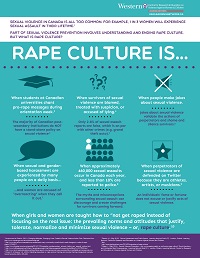Understanding Rape Culture

This infographic shows the different ways in which rape culture is perpetrated in the Canadian context.
View Infographic(PDF)
View Infographic(Image)
View Plain Text PDF
Sexual violence in Canada is all too common. For example, 1 in 3 women will experience sexual assault in their lifetime.
Part of sexual violence prevention involves understanding and ending rape culture. But what is rape culture?
Rape Culture is...
1. When students at Canadian universities chant pro-rape messages during orientation week.
The majority of Canadian postsecondary institutions do NOT have a stand-alone policy on sexual violence2. When survivors of sexual violence are blamed, treated with suspicion, or accused of lying.
Only 2-8% of sexual assault reports are false, which is on par with other crimes (e.g. grand theft auto).3. When people make jokes about sexual violence.
Jokes about sexual violence validate the actions of perpetrators and shame and silence survivors.4. When sexual and gender based harassment are experienced by many people on a daily basis…
…and women are accused of “overreacting” when they call it out5. When approximately 460,000 sexual assaults occur in Canada each year, and less than 10% are reported to police.
The myths and misconceptions surrounding sexual assault can discourage and create challenges for survivors coming forward.6. When perpetrators of sexual violence are defended on Twitter because they are athletes, artists, or musicians.
An individuals’ fame or fortune does not excuse or justify acts of sexual violence.When girls and women are taught how to “not get raped instead of focusing on the real issue: the prevailing norms and attitudes that justify, tolerate, normalize and minimize sexual violence – or, rape culture.
Interested in using Learning Network resources?
All our resources are open-access and can be shared (e.g., linked, downloaded and sent) or cited with credit. If you would like to adapt and/or edit, translate, or embed/upload our content on your website/training materials (e.g., Webinar video), please email us at gbvln@uwo.ca so that we can work together to do so.
All our resources are open-access and can be shared (e.g., linked, downloaded and sent) or cited with credit. If you would like to adapt and/or edit, translate, or embed/upload our content on your website/training materials (e.g., Webinar video), please email us at gbvln@uwo.ca so that we can work together to do so.






